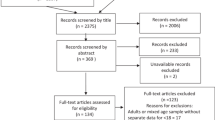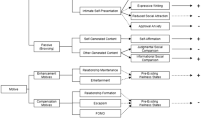Abstract
Previous research suggests that social support affects both career self-efficacy and career decision-making status. The purpose of this study was to analyze the relationship between social support and career indecision and the role that career self-efficacy plays in this relationship. A series of validated measures assessing social support, career self-efficacy, and career indecision were administrated to 700 Kosovar youth (mean age = 18.1 years, 57% women and 42.9% men). The findings revealed that social support was significantly negatively correlated with career indecision. The study results also indicated that social support was indirectly correlated with career indecision, as career self-efficacy played a mediating role in this relationship. The findings provide useful insight into the links between social support, career self-efficacy, and career decision making. Therefore, these results provide a foundation for the development of interventions for adolescents.



Similar content being viewed by others
References
Allison, Ch. & Cossette, M. (2007). Three theories of career development and choice. WA: Edmonds Community College.
Bandura, A. (1997). Self-efficacy: The exercise of control. New York: Freeman.
Constantine, M. G., Wallace, B. C., & Kindaichi, M. M. (2005). Examining contextual factors in the career decision status of African American adolescents. Journal of Career Assessment, 13(3), 307–319.
Diemer, M. A. (2007). Parental and school influences upon the career development of poor youth of color. Journal of Vocational Behaviour, 70, 242–258.
Felsman, D. E., & Blustein, D. L. (1999). The role of peer relatedness in late adolescent career development. Journal of Vocational Behavior, 54, 279–295.
Ferry, N. M. (2006). Factors influencing career choice of adolescents and young adults in rural Pennsylvania. Journal of Extension, 44(3).
Ferry, T. R., Fouad, N. A., & Smith, P. L. (2000). The role of family context in social-cognitive model for career related choice behaviour: A math and science perspective. Journal of Vocational Behavior, 57, 348–364.
Fisher, T. A., & Padmawidjaja, I. (1999). Parental influences on career development perceived by African-American & Mexican-American college students. Journal of Multicultural Counseling and Development, 27, 136–118.
Hayes, A. F. (2012). PROCESS: A versatile computational tool for observed variable mediation, moderation, and conditional process modeling [White paper]. Retrieved from http://www.afhayes.com/public/process2012.pdf.
Hayes, A. F. (2018). Partial, conditional, and moderated moderated mediation: Quantification, inference, and interpretation. Communication Monographs, 85, 4–40.
Herr, E. L., & Lear, P. B. (1984). The family as an influence on career development. Family Therapy Collections, 10, 1–15.
Jemini-Gashi, L. (2010). Factors influencing Kosovar adolescents' decision making for selection of profession [abstract]. Alb Science.
Jemini-Gashi, L. (2012). Career maturity and decision making of Kosovo adolescents for choice of profession. Announcements from the scientific conference “Science Week.” MEST.
Jemini-Gashi, L. (2013a). Psychosocial factors influencing the career decision making process among Kosovar adolescents. Scientific bulletin no. 1 (VII). The University of Tirana. ISSN 2227-7781. Retrieved from: http://www.planetar.edu.al/docs/buletini-7.pdf.
Jemini-Gashi, L. (2013b). Contextual factors, self-efficacy and career decision status of Kosovar adolescents. International Journal of Multidisciplinary Thought, 3(3).
Jemini-Gashi, L. (2014). Factors influencing the career decision making among Kosovar adolescents (Dissertation). Retrieved from: http://www.doktoratura.unitir.edu.al/wp-content/uploads/2014/12/Doktoratura-Liridona-Jemini-Gashi-Fakulteti-i-Shkencave-Sociale-Departamenti-i-Psikologji-Pedagogjise.pdf.
June-Schapeler Bergen, R. (2006). Family influences on young adult career development and aspirations (unpublished dissertation). University of North Texas.
Kelly, K. R., & Lee, W. C. (2002). Mapping the domain of career decision problems. Journal of Vocational Behavior, 61, 302–326.
Köhler, H. & Burghard, J. (2011). Draft strategy and action plan for orientation and career counseling 2013–2016.
Lent, R. W., Brown, S. D., & Hackett, G. (1994). Toward a unifying social cognitive theory of career academic interest, choice, and performance. Journal of Vocational Behavior, 45, 79–122.
Lent, R. W., Brown, S. D., Nota, L., & Soresi, S. (2003). Testing social cognitive interest and choice hypotheses across Holland types in Italian high school students. Journal of Vocational Behavior, 62(1), 101-118.
Lent, R. W., Brown, S. D., & Hackett, G. (1996). Career development from a social cognitive perspective. In D. Brown & L. Brooks (Eds.), Career: Choice and development (3rd ed., pp. 373–422). San Francisco: Jossey Bass.
Lent, R. W., Brown, S. D., & Hackett, G. (2000). Contextual supports and barriers to career choice: A social cognitive analysis. Journal of Counseling Psychology, 47, 36–49.
Lewko, J. H. (1994). The evaluation of career indecision in career development. Canadian Journal of Counselling, 28, 281–289.
MEST. (2011). Kosovo Education Strategic Plan 2011 - 2016. 25 “Draft Strategy and Action Plan for Career Orientation and Counseling 2013-2016. MEST, p. 34.
Nota, L., Ferrari, L., Solberg, V. S. H., & Soresi, S. (2007). Career search self-efficacy, family support, and career indecision with Italian youth. Journal of Career Assessment, 15(2), 181–193.
Osipow, H. S., & Winer, L. J. (1996). The use of the career decision scale in career assessment. Journal of Career Assessment, 4(2), 117–130.
Osipow, C., Carney, W., Yanico, K. (1976). Career decision scale. PA: Psychological Assessment Resources, Inc.
Palo, R., & Drobot, L. (2010). The impact of family influence on the career choice of adolescents. Procedia - Social and Behavioral Sciences, 2, 3407–3411.
Taylor, K. M., & Betz, N. E. (1983). Applications of self-efficacy theory to the understanding and treatment of career indecision. Journal of Vocational Behavior, 22, 63–81.
Wolfe, J. B., & Betz, N. E. (2004). The relationship of attachment variables to career decision‐making self‐efficacy and fear of commitment. The Career Development Quarterly, 52(4), 363-369.
Acknowledgments
L.J.G conceived of the presented idea. L.J.G, Z.H.D and K.K developed further the idea, conducted the research, analyzed the data and wrote the manuscript. L.J.G supervised the findings and the overall work. All authors discussed the results and contributed to the final manuscript.
Author information
Authors and Affiliations
Corresponding author
Ethics declarations
Conflict of Interest
The authors declare no potential conflicts of interest with respect to the research, authorship, and/or publication of this article.
Ethical Approval
All procedures in the study were performed in accordance with the ethical standards of the institutional and/or national research committee and the 1964 Helsinki Declaration and its later amendments or comparable ethical standards.
Informed Consent
Informed consent was obtained from all participants included in the study.
Additional information
Publisher’s note
Springer Nature remains neutral with regard to jurisdictional claims in published maps and institutional affiliations.
Rights and permissions
About this article
Cite this article
Jemini-Gashi, L., Duraku, Z.H. & Kelmendi, K. Associations between social support, career self-efficacy, and career indecision among youth. Curr Psychol 40, 4691–4697 (2021). https://doi.org/10.1007/s12144-019-00402-x
Published:
Issue Date:
DOI: https://doi.org/10.1007/s12144-019-00402-x




